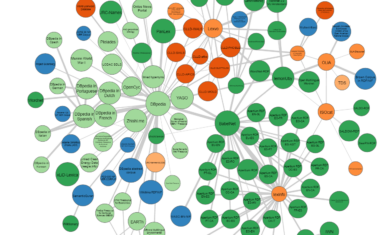The career outlook for artificial intelligence (AI) engineers is only looking rosier over time. The Bureau of Labor Statistics projects that, in the next decade, there’s going to be a 21% increase in computer and information research jobs, which includes AI engineering roles.
21% may not sound like staggering growth, but when you consider that there’s already a lack of qualified AI professionals, the picture starts to become clearer. AI engineers are in high demand, and given this, it’s not uncommon to see entry-level AI engineering jobs approaching six-figure salaries.
Want to capitalize on this trend? Then you’re in the right place. Below, we’ll walk you through how to become an AI engineer and point you toward the resources that can make this career a reality for you.
Ready? Then let’s get started.
What Does an AI Engineer Do?
AI engineers are software professionals who build tools and systems using various artificial intelligence techniques. That includes approaches such as machine learning, deep learning, and neural networks. The goal is to increase the efficiency of systems and make better use of data to drive business decision-making.
How To Become an AI Engineer: A 11-Step Guide

Landing a job as an artificial intelligence engineer takes a combination of strong technical skills, a strong theoretical foundation, and soft skills like effective communication and creative thinking. Let’s find out how you can go about gaining the key skills required to work in the artificial intelligence field.
-
Complete a Course
-
Learn the Fundamentals
-
Get Educated (And Keep Learning)
-
Learn a Programming Language
-
Build and Hone Your Skillset
-
Gain Relevant Experience
-
Create a GitHub Profile
-
Find a Mentor
-
Your Network Is Your Net Worth
-
Consider an Internship
-
Ace the AI Engineering Interview
Complete a Course
AI is a relatively new field, and one that is constantly changing. The best way to master the skills you need to launch your career is with a bootcamp. It’s the quickest and most convenient way to get the up-to-date skills you need to pursue a career as an AI-engineer.
Learn the Fundamentals
Artificial intelligence is a field that’s often quite misunderstood. Too much of the conversation surrounding it is driven by a fear of it being a mortal threat to human beings. For those who want to work in the industry, it’s important to see past this and gain a solid understanding of how artificial intelligence systems actually work.
So what is artificial intelligence? Artificial intelligence is a broad field of study that attempts to produce computational systems that can mimic human intelligence. To make that happen, various technologies like neural networks, natural language processing, deep learning, and adversarial networks are used.
A simple example of AI is the digital assistants we use in our everyday lives, like Siri and Cortana. These voice assistants use our voice commands and the data on our phones as the training dataset. They learn from that data and are eventually able to better detect what we want and serve up results faster.
Get Educated (And Keep Learning)
Artificial intelligence professionals take a few different routes on their way to a job in the field. Let’s take a look at what those are.
Four-Year Degree
The most common path to an AI engineer career is through a college degree. You can go with either a degree in computer science or mathematics. Both provide a range of courses that are relevant to AI. The rest you will have to pick up on your own, either on the job or independently.
Bootcamps
The less conventional but often more convenient way of becoming eligible for career opportunities as an AI engineer is by working through bootcamps. There are various providers who offer bootcamps on artificial intelligence and related fields like machine learning.
There are a few reasons why bootcamps have become an attractive option. For starters, they’re a flexible mode of learning. You can choose whether you want to study online or offline, how long you want to spend on the course, and can select one after you’ve vetted the instructors.
Bootcamps are also a lot more affordable than a college degree. Some allow you to pay after you’ve landed a job. And, some bootcamps provide job guarantees and career support, making this an easy choice for most learners.
Self-learning
The Internet is full of resources for those who want to study AI on their own. If you’re somebody who is an autodidact and trusts yourself to stay motivated through the entire process, then this is the most affordable and flexible path to choose.
Learn a Programming Language

Not all AI engineers use programming, but most know how to code with at least one programming language used for AI. Here are the programming languages that you can consider starting your journey with:
Python
Python is among the most popular programming languages used to build AI and machine learning applications, as Python has a range of libraries for AI and machine learning. If you’re just starting out, then consider starting with Python because of its intuitive syntax and simplicity.
Java
Java is a programming language that is used for a wide number of applications, including artificial intelligence systems. The advantage of using Java for AI is that there is a huge community around the language and you can always get help if you need it. Learning Java also means that you can move between different kinds of operating systems and device types and still be able to develop programs for them easily.
R
R is a programming language that’s focused on statistical analysis. It provides various libraries that cater to those who have a knowledge of statistics and want to use it to develop artificial intelligence models. Make sure that you have the statistics and mathematics knowledge required to work with such a programming language before beginning your journey with R.
Others
Haskell, Lisp, C++, and Scala are also languages that are used by artificial intelligence engineers. These are usually selected when they provide a specific advantage for a certain application that’s being built. If you’re just starting out, stick to Python, and then learn other languages if a project demands it.
Build and Hone Your Skillset

Knowing how to program is only a small part of the overall skillset of an artificial intelligence engineer. You need to have a firm understanding of several other areas and skills if you are to become proficient at this job. Let’s take a look at what they are.
Technical Skills
Algorithms
Algorithms are the foundation of all software development. So if you’re applying for AI roles, then recruiters will test you on your knowledge of algorithms to make sure that you understand how to write them.
Machine Learning
Machine learning is an essential skill when it comes to working as an artificial intelligence engineer. You need to be proficient at using techniques like logistic and linear regression to build robust machine-learning models. A broad understanding of machine learning will significantly boost your ability to land AI job roles.
Image and Language Processing
Most AI engineers work on either image- or language-based data. So it’s important that you understand image processing and how to work with natural language processing systems. There is huge demand nowadays for AI engineers who have hands-on experience in these areas.
Soft Skills
Working as an artificial intelligence engineer isn’t all about crunching numbers and constructing models. Let’s take a look at the soft skills that you will need to succeed in your career journey.
Analytical Thinking
Working as an AI engineer means that you’re constantly dealing with a wide range of problems and have to deal with data coming in from a variety of sources. As an AI engineer, you’ll have to analyze problems quickly so that you can choose the most effective path forward.
Business Acumen
Most successful AI engineers out there have some business skills. They understand how business processes work and have a basic understanding of how business intelligence guides business decisions. This industry knowledge is something you should work on gaining slowly so that you can situate your work within the context of organizational goals.
Communication
Your communication skills will be put to the test as an AI engineer. This is a job that requires you to work in tandem with software engineers, project managers, product managers, and other professionals, including nontechnical stakeholders. You’ll have to quickly learn how to listen actively and communicate so that your point gets across politely and effectively.
Gain Relevant Experience
Here are a few ways that you can gain some AI experience if you haven’t yet landed an entry-level role.
Volunteer Work
There are plenty of non-profit organizations and small businesses that hire volunteer engineers. Look up local organizations in your area to see if they need a helping hand in their IT or software department. Then, you can add those projects to your portfolio.
Freelance Work
Freelance projects give budding AI engineers the opportunity to work on projects of their own choosing. Make sure that you convey your capabilities right at the outset and have a point-of-contact who can help you if there are any hold-ups in the process.
Open-Source Projects
This is the easiest way to dip your toes in a production environment as an artificial intelligence engineer. Open source projects allow you to read codebases and see how AI engineers achieve the things they do. Once you know how to read code, you can move on to identifying bugs and recommending fixes.
Hackathons
Hackathons are competitions where you will be given a small amount of time to build a specific AI application. It is a low-stakes situation where you learn a lot of new things quickly and walk away with a project that you can add to your portfolio.
Create a GitHub Profile

An easy way to demonstrate your practical expertise is by showing your work on GitHub. The platform serves as a portfolio of projects that includes your code base. You can also use it to collaborate with other engineers and contribute to a range of other projects.
Find a Mentor
Mentorship gives candidates the kind of leg up that few other things can as they work their way toward a career in AI. Mentors provide you with tailored support and can help you make key decisions using information gained through years of experience.
If you’ve come through a college or bootcamp, then you can turn to professors and instructors for mentorship. You might also consider approaching industry professionals, such as senior AI engineers, to serve as mentors to you. Websites like MentorCruise and CodeMentor can be helpful towards that end.
Your Network Is Your Net Worth
Having connections in the industry is a huge advantage for those hunting for jobs in artificial intelligence. Here are a few ways to build those connections:
LinkedIn allows you to easily search for and connect with engineers and managers in the artificial intelligence space. You can slowly build a relationship with your connections by interacting with their posts and showing genuine interest through thoughtful comments. You can then take that forward by requesting a phone call or in-person meeting with a specific ask.
Conferences and Meet-ups
Most major cities have communities that cater specifically to AI professionals. Attending these events is a great way to quickly meet a lot of people who can help you with your technical skills or in your job hunt.
Online Communities
The following online communities provide an environment where you can keep up with developments in the industry and meet others who are passionate about AI technology:
Get To Know Other Data Science Students
Joy Opsvig
Data Science Apprentice Engineer at LinkedIn
Garrick Chu
Contract Data Engineer at Meta
Jonathan King
Sr. Healthcare Analyst at IBM
Consider an Internship
Most companies hiring AI engineers also have internship programs available. LinkedIn and Glassdoor are great places to start your search. Make sure that you have your portfolio ready to go and are prepared for the interview, which is what we’ll cover next.
Ace the AI Engineering Interview
Once you’ve gained the skills and made a portfolio, you’ll eventually find yourself landing interviews for AI engineer roles. It’s essential that you get this final step right because it will decide whether you land your dream job or not.
How do you prepare? We’ve put together lists of the most common artificial intelligence and machine learning interview questions for your benefit. Once you’ve worked on your broad skillset, you can move on to specifically preparing for these interview questions so that you know what you’ll be up against in the interview.
Becoming an AI Engineer: Real-Life Examples
Here are a few people who went on the journey that you’re starting out on and have insights on how you can land your dream job in the best way possible.
Nicolai Nielsen
Nicolai Nielsen is an AI engineer who works in the field of computer vision. He produces videos that give you a glimpse into the life of an AI engineer and also goes over technical topics like edge detection, image stitching, and object detection.
Jérome Crevoisier
Jérome Crevoisier is a great example for those who want to take the self-learners path to a career in artificial intelligence. In his Medium post, Jérome goes over the specific courses and projects he built to gain skills as an AI engineer.

How Much Can You Make as an AI Engineer?
Entry-Level AI Engineer
Entry-level AI engineers have an average salary of $70,317 annually.

Mid-Level AI Engineers
Salaries for mid-level AI engineers start off at around $108,000 and that’s the base income you can expect as a mid-career engineer.

Senior AI Engineer
Senior AI engineers make an average annual salary of $137,699.

Resources To Find AI Engineering Jobs
Here are a few ways that you can go about finding jobs in the AI industry.
LinkedIn has become the best place online to find jobs in any field. The best part about the job search on the site is that you can set up a job alert to notify you as soon as new jobs are posted for AI engineers. That way, you can stay up-to-date with openings without having to actively check the postings regularly.
Job Boards
The following are job boards that post openings specifically in the AI industry:
Network
As we said earlier, networking is key if you want to land a job in the AI industry. You should make sure that you’re regularly connecting with recruiters and professionals in the AI space, both online and in person. Make sure that you build these relationships over time so that you can turn to individuals in your network when you’re looking for a job.
Slack Communities
Slack has become the go-to spot for members of the AI community to congregate online. Here are a few communities that you should consider joining:
How To Become an AI Engineer FAQs
We’ve got the answers to your most frequently asked questions:
Can You Become an AI Engineer Without a Degree?
Yes, it is possible to become an AI engineer without a degree. Companies now hire bootcamp graduates who are able to demonstrate experience in the field with their portfolio.
Does an AI Engineer Need To Know How To Code?
Not all AI engineers code. That said, it is important that you know the basics of coding so that you can solve problems programmatically when required. Python is a good beginner programming language if you want to work in AI.
Is AI Engineering Math-Heavy?
You do need to have a strong understanding of certain math concepts to work in AI. That includes linear algebra, calculus, probability, and statistics.
Since you’re here…
Curious about a career in data science? Experiment with our free data science learning path, or join our Data Science Bootcamp, where you’ll get your tuition back if you don’t land a job after graduating. We’re confident because our courses work – check out our student success stories to get inspired.







